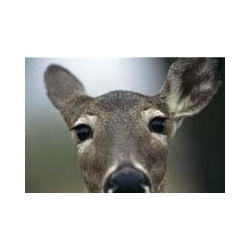
Chronic Wasting Disease is on the move--and could be coming to Winneshiek County.
DNR Wildlife Biologist Terry Haindfield says deer have tested positive for CWD in Allamakee County, in the area of Lansing, Marquette and Waterville. In addition, a positive test result has been obtained from a deer in Preston, Minnesota--10 miles from the Iowa border.
CWD is a neurological disease belonging to the family of diseases known as transmissible spongiform encephalopathies (TSEs) or prion diseases. It attacks the brain of infected deer and elk causing the animals to lose weight, display abnormal behavior, lose body functions and die. It is always fatal to the infected animal.
Haindfield says this is the time of the year when deer begin to roam, especially juveniles. It's not unusual for yearlings to travel 10 miles and some juvenile does have traveled 30 miles. Deer herds travel this time of the year to head for favorite wintering areas.
All that means deer with CWD could come in contact with other deer, which could in turn pass along the disease.
That's what makes taking a tissue sample from a harvested deer so important. Haindfield says DNR employees will be out in the fields, talking with hunters who have agreed to let the DNR take a tissue sample from the deer they have shot. Once those small tissue samples are taken, they are sent to labs at Iowa State University or Colorado State University to test for CWD. If you're willing to allow the DNR to take a tissue sample from a deer while you're out hunting, contact Haindfield at (563) 380-3422.
The Iowa DNR has more information about CWD and other infectious disease online at www.iowadnr.gov/cwd.
Site designed and maintained by Iroc Web Design Services©.
Your Small Business Web Design Solutions.™


